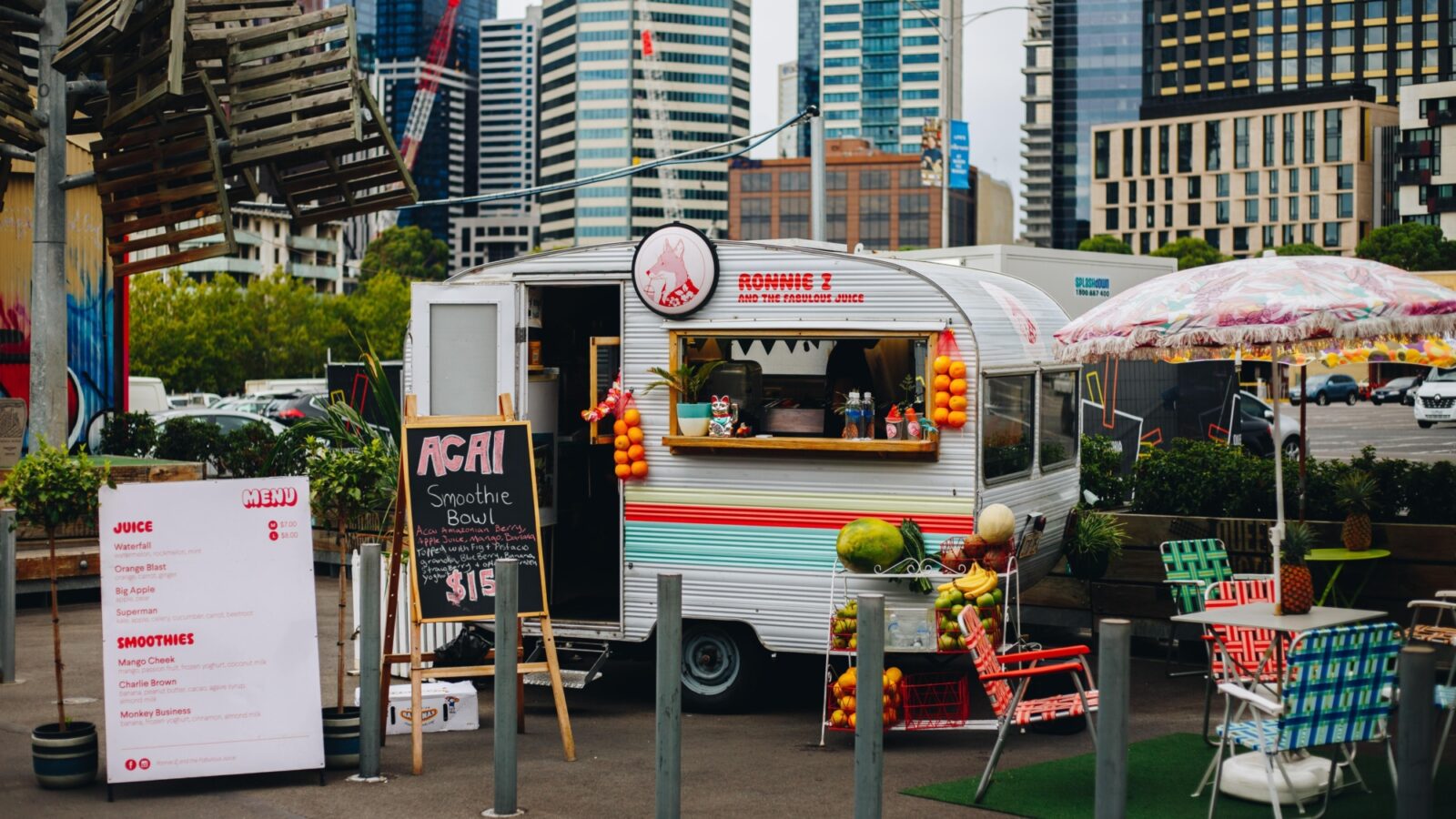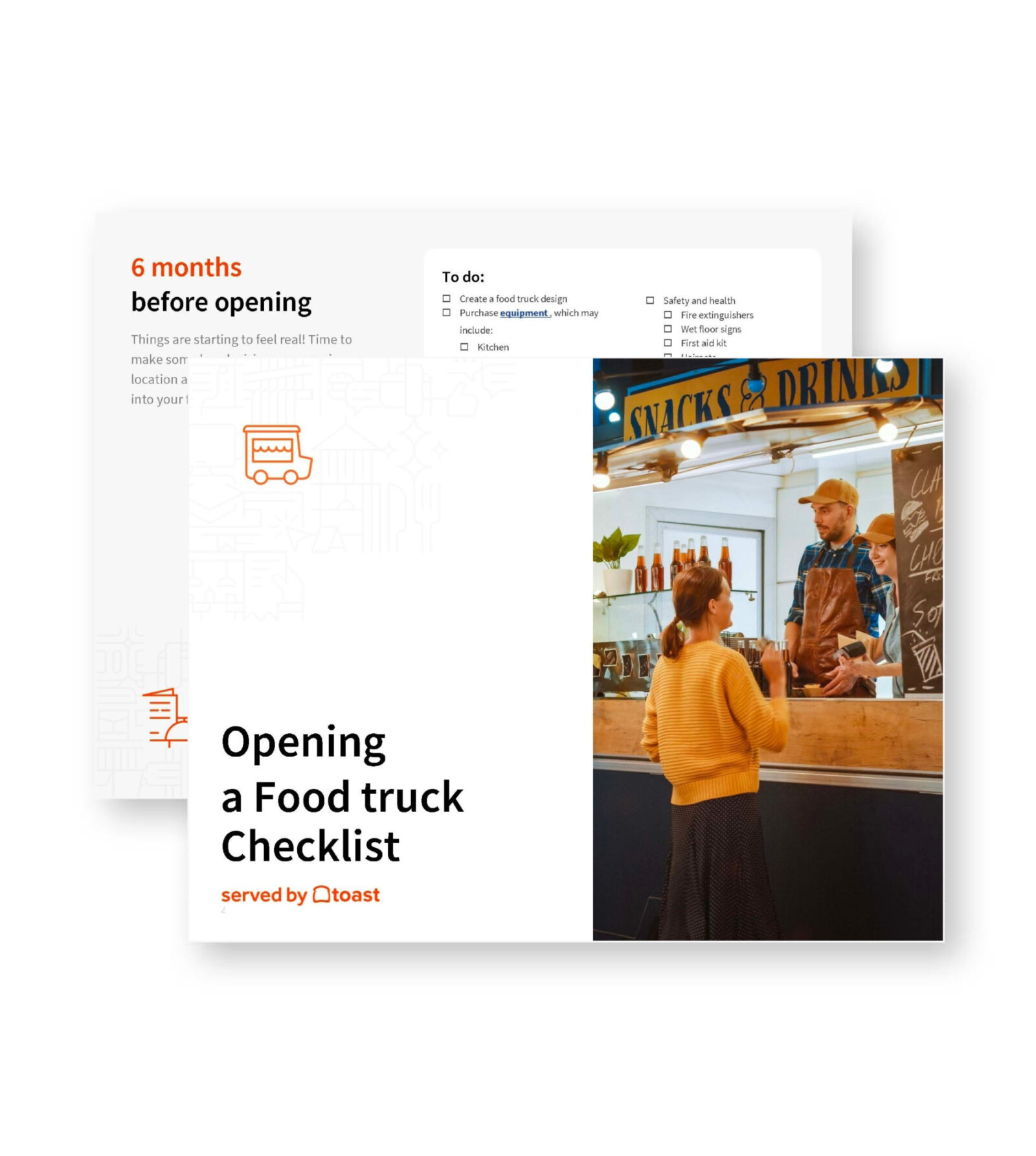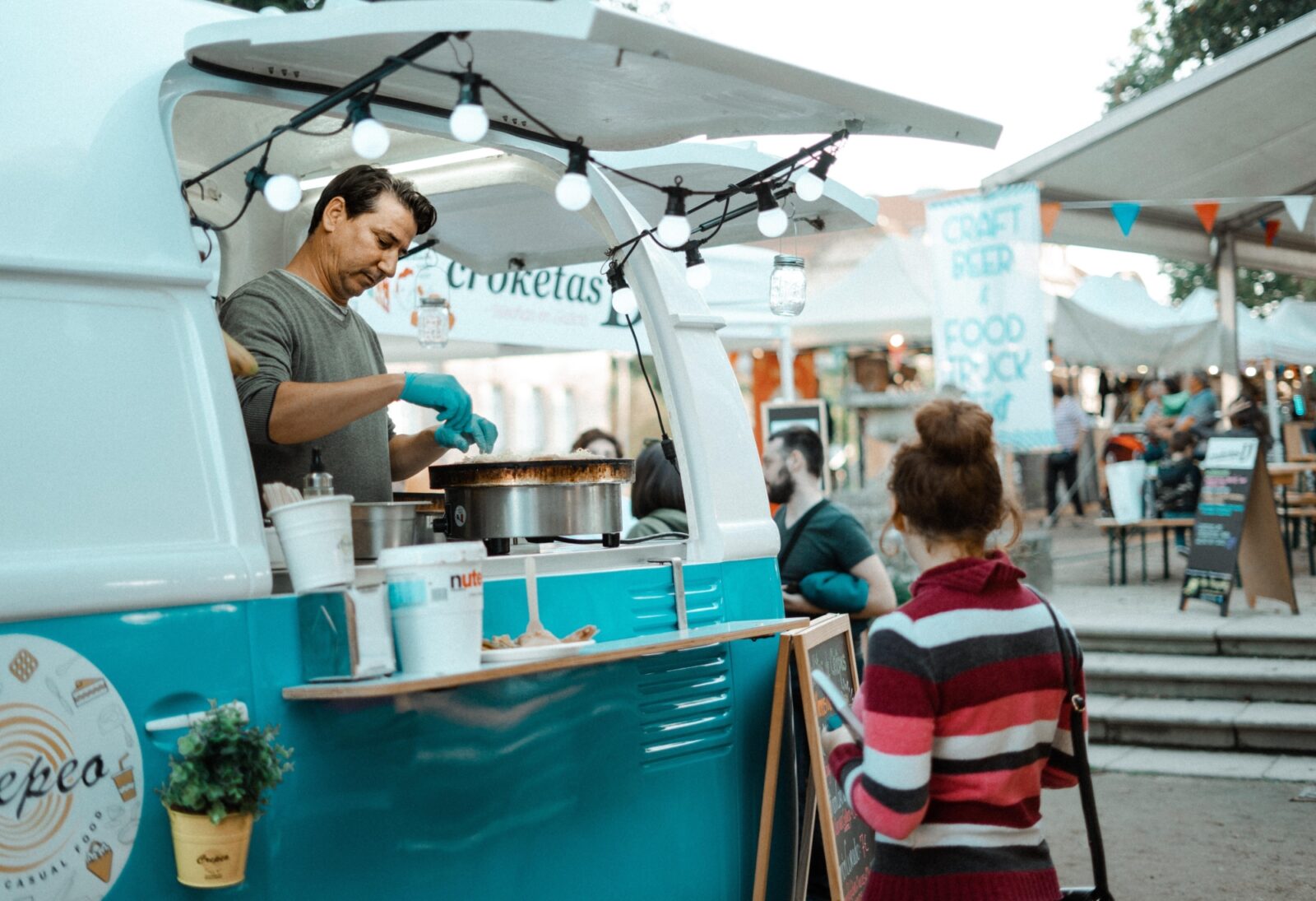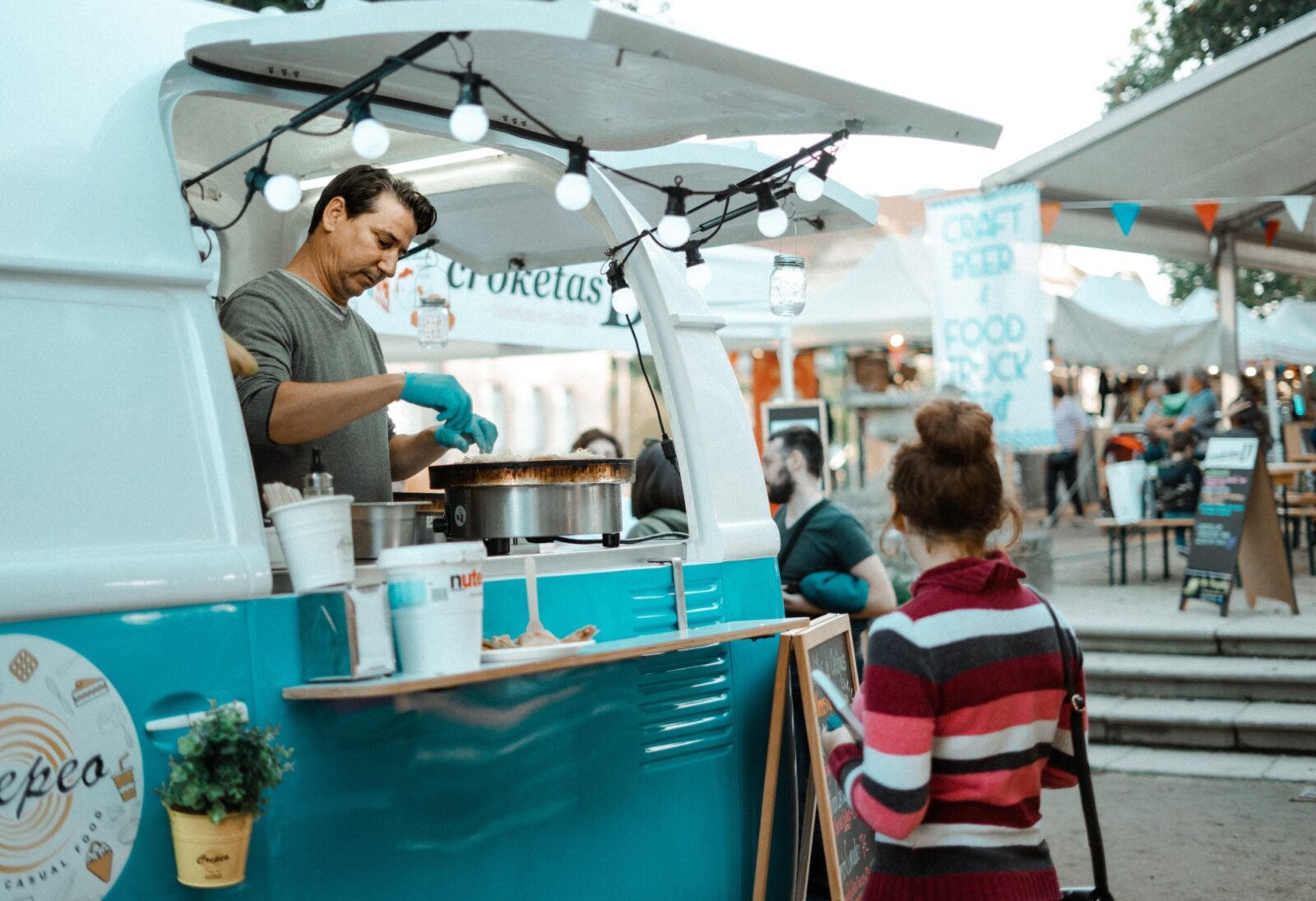
How to Open a Food Truck: Starting a Food Truck Business Steps
Looking to learn how to start a food truck business? Here’s a step-by-step guide on what you need to start a food truck, from restaurant branding to operations.

Katherine BoyarskyAuthor


Opening a Food Truck Checklist
So many things go into opening a food truck. With this free PDF checklist, you'll set your new business up for success.
Get free downloadWhat Do You Need to Start a Food Truck Business? (Checklist)
Food trucks are wildly popular restaurants, contributing to a $2B per year mobile food business industry in the US alone. Food trucks often have innovative food options that are hyper-niche. They have the additional benefit of being portable, serving as an ideal food choice for outdoor festivals, sporting events, communities of businesses, tourists, and other large groups of people on the go. A flexible, non-traditional way of opening a restaurant.
So, how do you turn your dream of starting the first ramen burrito food truck (let us know if this already exists…) into a real mobile food truck business? How do you figure out where to bring your truck, how to control food waste, and how to measure your growth without wasting too much cash along the way?
Luckily, there are almost 24,000 others who have started food trucks in the US and who are on the road today.
We’ll review how to start a food truck business, lessons learned from food truck pros, and whether or not food trucks are profitable, or worth it. With restaurant analysts predicting a rise in the food truck industry and a strong following of Millennial and Gen Z patrons, starting a food truck business is a worthwhile investment for the next generation of Carl Caspers and perfect Cuban sandwiches.
The Ultimate Guide to Restaurant Branding
Use this guide to get tips on how to create a restaurant brand that stands out, attracts customers, and drives repeat visits.

Why People Start Food Truck Businesses
Many food truck owners will get asked, “Why did you open a food truck and not a restaurant?” And they’ll tell you— a food truck business is a restaurant, on wheels. It’s a modified restaurant that cuts out most of the roles in a standard brick and mortar shop, but it serves food much like a fast casual restaurant does. Quickly and in waves.
Are food trucks profitable?
Ask Roman Rytov, CEO and co-founder of food trucks Wheely Grilly and Incrediball Falafel why he started his food truck business and he’ll tell you a more technical answer than you may be expecting. “We decided not to open the restaurant first, because it’s risky. Instead, we thought about how we can verify our assumptions on the food, the concept, etc. taking the agile development approach,” Rytov says.
For those who don’t know about agile development, it’s a way to test out your ideas before investing too much time and money in them, and make decisions based on data. Food trucks can then act as a sort of test kitchen, with diners who are eager to try more experimental foods, then lead to a full fledged menu item at a restaurant location in the future.
And to answer the question, are food trucks profitable? Food trucks bring in, on average, a 1.5-4x return on investment.
Food Truck Startup Costs + Ongoing Expenses
The average cost of purchasing a food truck and acquiring food truck permits and licenses can range from $50-60,000, with the food truck permits and licenses alone adding up to $25K+ in some states.
On the whole, the maintenance and upkeep of a food truck business can run several thousand dollars per month and includes:
Food truck maintenance, upkeep, and gas and/or rental payment
A prep kitchen space
Supplies and equipment
Licenses and legal fees
Food and ingredients
Marketing and promotion
Permits
Insurance
Lessons from Food Truck Owners
Is owning a food truck hard? Well, owning and operating a mobile food truck isn’t immediately a breeze. Here are lessons learned from other food truck owners.
Listen to your customers, then make changes.
“In an office-dense area, we brought some plastic boxes, which are very convenient containers. The problem was, people weren’t seeing what we were selling. So one day, we tried an open container instead. We switched it, and the effect was immediate. People started coming and saying, “I saw a guy walking from here with a gorgeous looking dish.” They didn’t know the price; they didn't even know the name of the food truck. They just wanted the food,” Rytov says.
If you notice a trend in your customers and their experience, or a potential way to reach more customers — test it out! Food truck mentality largely depends on testing and optimizing to improve your operations.
Prepare for the unexpected costs of running a food truck.
Erik Metzdorf, owner of Metzy’s Taqueria, tells new food truck owners “running a food truck business is not easy.” He advises new mobile restaurant owners to plan for expenses like generator costs, event costs, and prep costs, and to really think about the audience. He recommends focusing on hiring an all-star food truck crew, staying true to your values and restaurant theme, and having fun.
Biggest Challenges for Food Truck Owners
Food truck owners experience a number of challenges during their ongoing operations. Here are some top challenges for food truck businesses and how to solve them.
Food waste
Partner with local shelters or schools for situations where you are stuck with unused food. Do as much lean food prep as possible and have a backup plan if a certain planned location doesn’t pan out.
Weather/environmental factors
Use social media and restaurant marketing to promote your business, create exclusivity, and draw a crowd no matter the weather. Depending on something like people finding you because they’re out and about doesn’t work out in variable climates.
Permits and parking
Work with a lawyer and an accountant that can help you do your research and obtain permits ahead of time or identify parking options early. Then, stay put: Fines can be high and create challenges for going to certain locations in the future.
Technology
Invest in food truck technology that allows you to get orders out quickly and with little hassle from your already busy food truck team.
10 Steps to Start and Grow a Food Truck Business
Starting a food truck business relies on strategy and creativity. Growing one takes skill, perseverance, and a passion for your food.
Step 1. Develop a food truck concept.
Find your restaurant concept for your food truck. Take your food, your own personal flair, and a bit of marketing and design a bold new food truck idea that’s never been done before. When you’re creating your food truck name and theme, be careful to do a search for the name online and on social media. Puns are common in food truck names and there are only so many food puns!
Step 2. Create a detailed food truck restaurant business plan and research your local area.
Put together a food truck restaurant business plan that you can use to take out a loan or share with potential investors. There are ways to secure grant funding for new businesses or apply for loan programs for restaurateurs, so research these programs if you’re hoping to start a food truck with no money.
During this phase, research your local community to learn more about what food trucks and businesses exist already, where you may be able to bring the truck, how many people you could serve, and what your competition looks like.
Step 3. Build a restaurant marketing, branding, and social media strategy for your mobile food truck.
A restaurant branding strategy is important for food trucks, particularly social media. Use restaurant social media marketing to promote your food truck, update where and when it will be around, partner with influencers, and share photos and videos of your food.
If we learned anything from the delightful film, Chef, it’s that there is nothing more powerful for food truck growth than a child on social media.
Key restaurant branding items that are a must-have for food trucks are:
Restaurant website
Restaurant brand including logo, color scheme, and values
Social media accounts
Emails or promotions via SMS
Step 4. Research and obtain necessary equipment (including a truck or two) and food truck permits for your area.
An important step of the food truck startup journey is getting a truck and equipment. For obtaining a food truck, you can either purchase a truck or rent a truck. When purchasing a food truck, you’ll have the option to either buy a fully equipped truck or do it yourself. As you can imagine, you’ll pay significantly more for a decked out truck, but it’ll be up to code and ready to serve.
Find some of the common of your restaurant licenses and permits here, and be sure to look up the federal requirements for opening a food truck, as well as the requirements in your state, like these requirements for mobile food establishments in Massachusetts.
When investing in equipment, choose technology that is suited for your business as a fast-paced food truck. More specifically, look for a point of sale (POS) system that is designed for food trucks.
“We decided to go with Toast Restaurant POS. Online ordering was a showstopper, multi-location management was a must, and individual reporting is critical. I want to see individual customer reporting, including every individual item she bought, in which location, at what amount. Then, we can define the trends that are empowering for us. I wanted to have that very fine grain level of data at my fingertips. Toast won that competition. When we took all of our qualifying factors together, there were no other options.” Roman Rytov
Step 5. Hire a rockstar staff.
Your staff can make or break the success of your food truck business. It’s tight quarters and you spend your time in between locations together, so it can make for long days. Find people who believe in your vision, who have a connection with the community, and who are prepared for hard work and long hours. Then, pay them well and provide benefits so they feel appreciated, stay engaged, and stay for years.
Step 6. Purchase food, ingredients, and supplies.
When purchasing food for food trucks, the more you can purchase on a per-event basis, the better. The food truck industry is flexible and requires a degree of being able to pivot at a moment’s notice. Develop tight relationships with your food suppliers and maintain transparency and honesty in all communications.
Step 7. Do a test run of your food truck.
After purchasing food and ingredients, it’s time to get out there. Before you do anything, post about it on social media. Do a test run with family and friends to make sure your equipment is working, you have the right ratio of ingredients, and your software is working so you can make money.
Step 8. Start selling and optimize your food truck sales strategy.
Once you’ve tested out your food truck operations, it’s time to test out your menu, locations, pricing, and anything else you can test. Try updating packaging, partnering with other local food trucks and businesses, and scoping out new events. The more data you can collect, the more you’ll be able to improve your business.
Step 9. Test your food truck locations and timing.
Rather than establishing one location for your food truck up front and staying there forever, try a few different locations and crowds. Maybe the 1 AM crowd absolutely eats up your pretzel dogs, but the lunch crowd isn’t feeling it like you thought they would. You won’t know until you try!
Step 10. Expand your food truck fleet.
The last step in starting a food truck business is expanding that business. Once you’ve found your groove with your mobile restaurant, expand by growing out your fleet, or by opening an entirely new truck with a new concept. If you were using your food truck as a test kitchen, this might be the right opportunity to open a brick and mortar shop, while maintaining your truck if possible.
Food trucks are scrappy and have the potential to grow into local favorite establishments, often becoming associated with different community gatherings and areas. Your food truck could become the bright light in an office worker’s week or the go-to for a parent on their morning walk. Take the first steps by choosing the right name for your food truck restaurant and the rest will be history.
Related Food Truck Resources
- How Much Does it Cost to Start a Food Truck
- Food Truck POS Comparison Tool
- Best Food Truck Ideas
- Food Truck POS System
- Food Truck Name Ideas
- Food Truck Equipment
- Food Truck Design Ideas
- Food Truck Websites
- Food Truck Marketing Ideas
- Food Truck Menu Ideas
- How Much Do Food Trucks Make
- How to Do Food Truck Branding
- How to Write a Food Truck Business Plan
- Food Truck Business Plan Template
- Food Truck Design Ideas
- Food Truck Licenses and Permits
- Best Food Truck POS Systems
- Food Truck Supplies
Food Truck POS Comparison Tool
A free, customizable Food Truck POS Comparison Tool to research and compare point of sale systems in one Excel spreadsheet or editable PDF.

Is this article helpful?
DISCLAIMER: This information is provided for general informational purposes only, and publication does not constitute an endorsement. Toast does not warrant the accuracy or completeness of any information, text, graphics, links, or other items contained within this content. Toast does not guarantee you will achieve any specific results if you follow any advice herein. It may be advisable for you to consult with a professional such as a lawyer, accountant, or business advisor for advice specific to your situation.
Read More
Subscribe to On the Line
Sign up to get industry intel, advice, tools, and honest takes from real people tackling their restaurants’ greatest challenges.


